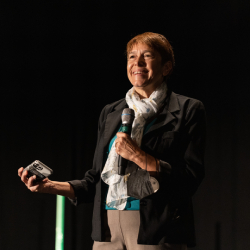A Letter from Executive Director Catherine O’Riordan

O’Riordan speaks at the 2022
Annual Meeting
Members,
As we compiled information for this 2022 annual report—results from grant-funded programs, member-facing initiatives, big moves among our primary drivers of revenue—it was hard not to feel a great deal of pride in all that we accomplished. Though COVID is still a reality and systemic inequities in STEM aren’t something we can solve on our own, I think I speak for the entire leadership and staff when I say that we came through two-plus extremely challenging years stronger than ever, and we kept that work progressing all last year.
Maybe the most notable outcome from last year was a hugely successful in-person Annual Meeting held in Montreal. While the community rallied to support virtual events in 2020 (true across the entire association landscape), the limits of people’s enthusiasm for virtual showed in 2021. But by the time we were making final preparations for Montreal, it was clear that we weren’t just rebounding—we were thriving! On top of a remarkably large number of submitted session proposals and abstracts, we were able to work with CSEE and other groups to host an important series of events around diversity and Traditional Ecological Knowledge that really helped to define the 2022 conference. These events were just one realization of several years of work on DEIJ that’s meant to better support the career aspirations of all ecologists and honor all ways of understanding ecology.
In 2022, changes in ESA governance were implemented through new Bylaws to increase transparency and engage more members in leadership roles. We held our first meeting of the redesigned Council—now, rather than a collection of all the decision-makers in the Society, the Council includes a representative from each of ESA’s constituent sections and chapters, elects its own leadership (with ex officio attendance at Governing Board meetings) and is charged with helping to set the Society’s strategic agenda. Inaugural Speaker Ariane Peralta handed over the gavel to Lin Meng and Council representatives formally elected a Speaker-elect for the first time (Emilie Graves).
These are important developments for a 108-year old society like ESA. Organizations are built to serve their members; if the members find that the organization doesn’t suit their needs, they’ll leave it. The fine details of projects like governance reform probably don’t interest the individual grassroots member very much, but we hope the end result does—we strove to increase transparency of ESA’s decision-making, and to create greater leadership opportunities for more members, and in turn better respond to (and meet) the needs of all ecologists.
You are the driving force behind ESA, and I hope the work we’re doing together matters to you. We as staff always strive to improve so that what we deliver to you—programs and benefits—are meaningful to your experience as professional ecologists. Please always let us know if there ways we can enhance your experience. And consider getting more involved and serving your scientific community through ESA.